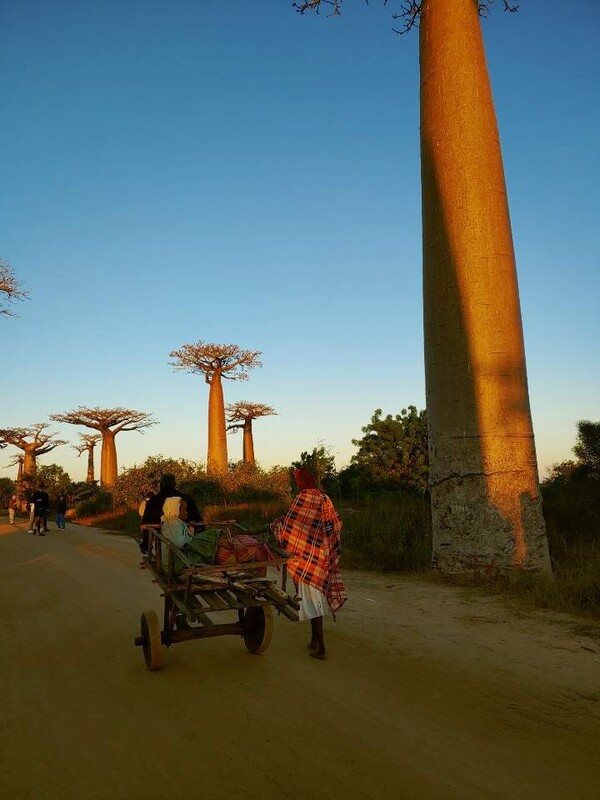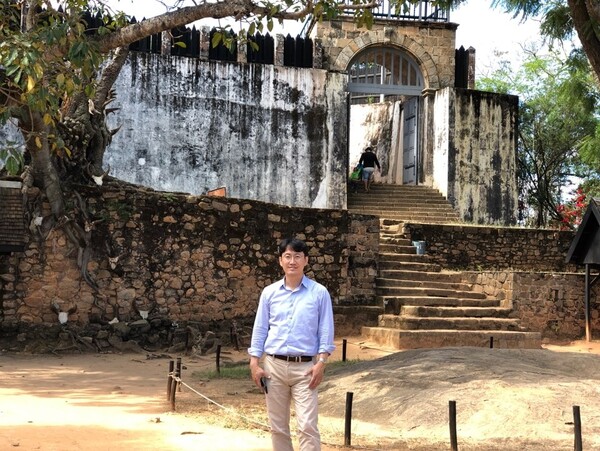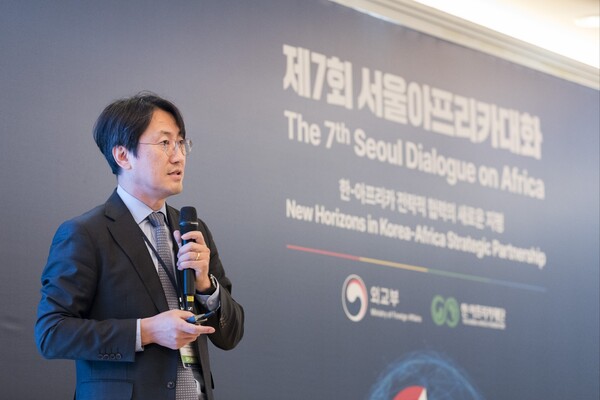As an African proverb goes, “The eye never forgets what the heart has seen.” At Sungkyunkwan University (SKKU), there is a professor who brings Africa closer to the heart through both expertise and experience. Join the Sungkyun Times (SKT) in exploring the extraordinary journey of Professor Cho Won-bin, a specialist in African politics in the Department of Political Science and Diplomacy.
Whiapers of The Savannah
Q1. Please introduce yourself.

Hello, I am Cho Won-bin, a Professor of Political Science and Diplomacy at SKKU. I currently serve as the faculty advisor at Oehyeonjae, an organization affiliated with the foreign affairs exam preparation program, and as the Dean of the Special Graduate School of Strategic Studies. I earned my bachelor’s degree in political diplomacy at SKKU in 1996, completed my master’s degree in political science at Seoul National University, and received my PhD in political science from Michigan State University (MSU) in the United States (U.S.). My area of specialization is African politics, a relatively rare specialization within the department.
Q2. Please share your reasons for majoring in political science and diplomacy and the activities you have been involved in.
I have been interested in leadership since I was young, and with dreams of becoming a politician, I began considering a career in political science and diplomacy during high school. When I entered SKKU in 1989, South Korea had already undergone democratization, but the process still required active civic engagement. This atmosphere led to the flourishing of various academic societies on campus, leading me to join the International Politics Society. Through this experience, I was able to build an academic foundation and broaden my intellectual perspective.
Q3. What was your biggest challenge as a student?
By the end of my freshman year, I began to feel a gap between the expectations I had for the Department of Political Science and Diplomacy and the reality. My high school dream of becoming a politician was also shaken when I encountered real-world politics at university. In particular, I found myself uninterested in the challenging teaching style of one professor who taught a firstyear major course. Also, club discussions did not resonate with me, and I decided to take a step back by enlisting in the military. During that time, I became more aware of the deeper issues within Korean politics, which marked a turning point in my academic journey.
Q4. What has been the most important in your path as a researcher?
The question “Why?” has guided me throughout my academic journey. During classes and academic conferences, I came to realize that Korean politics was more problematic than I had initially thought. Naturally, my concerns deepened as I discussed with my seniors why Korean politics had not progressed further. While serving in the military, I found joy in reading political classics such as Machiavelli and Aristotle, which sparked a genuine interest in the field. After being discharged, I became eager to pursue further studies. With encouragement from my seniors, I joined graduate seminars and began to seriously consider a research career. These questions eventually led me to expand my focus beyond Korean politics and develop an academic interest in African Politics.
Q5. What led you to specialize in African politics within your major?

Initially, I did not plan to study Africa. I was more interested in American politics, particularly congressional politics, and took related courses during my master’s program. However, Michael Bratton, a Professor of Political Science and African Studies at MSU, was looking for a student skilled in statistics for his research. With the recommendation of other professors, he invited me to join the project. Unlike previous case studies, this project offered a new approach to African politics. That was the moment Africa came to me.
Voices in The Wind
Q6. Have you visited Africa or conducted field research there since you chose it as a major?
My first visit to Africa was in October 2004, when I spent two months at the University
of Cape Town in South Africa, delivering lectures on Afrobarometer data. Afterward, I conducted fieldwork for my doctoral dissertation for two months in Lesotho, where I interviewed political elites, such as members of parliament, senior government officials, and civil society leaders. After returning to Korea and joining SKKU as a professor, I have continued to conduct field research in Africa nearly every year. To date, I have visited Kenya, Tanzania, Rwanda, Madagascar, Ghana, Gabon, South Africa, Lesotho, Ethiopia, Morocco, and more.
Q7. What was the purpose behind inviting two ambassadors during the African Politics course?
Last semester, two ambassadors were invited to the African Politics course to share insights with students aspiring to become diplomats. One was a Korean diplomat who had served in South Africa, and the other was the Tanzanian ambassador to Korea. These guest lectures were intended to give students a realistic perspective on diplomatic careers. The African Politics course, a core subject in the Department of Political Science and Diplomacy, emphasizes understanding Africa’s diversity. It seeks to nurture future professionals who can contribute meaningfully to strengthening Korea-Africa relations by offering opportunities to hear directly from African representatives.
Q8 Could you tell us about Oehyeonjae and share some meaningful moments while leading it?
Oehyeonjae is one of SKKU’s national exam preparation programs, specifically designed to help students pursue careers in diplomacy. I have served as its academic advisor since 2014. As a proud alumnus of SKKU, I have continued in this role, strengthened by my connections with fellow alumni serving as diplomats in the Ministry of Foreign Affairs (MOFA). Interestingly, the name Oehyeonjae was chosen by the students themselves. Originally, the group was simply called the Diplomatic Exam Preparation Group, but the students wanted something more meaningful. I thought it would be best to let them decide, which resulted in the current name. What brings me the greatest pride is creating opportunities for students not only to pursue their dreams but also to hear firsthand stories from senior alumni — which often lead to tangible outcomes. When I was a student, there were few SKKU graduates working in diplomacy. Now, Oehyeonjae produces at least four to six diplomats each year.
Songs of Tomorrow
Q9. What competencies do you hope your students will develop through your teachings?
One of SKKU’s visions is to cultivate global leaders, and I believe the Department of Political Science and Diplomacy plays a key role in achieving that goal. However, students’ perspectives often remain limited to regions like the U.S., Europe, and Northeast Asia. Therefore, I hope they will broaden their horizons to include areas such as South America and Africa, which are equally important on the global stage. Especially now, as international interest in Korea continues to grow, it is unfortunate that we do not always view the world with sufficient depth. I hope that our students grow into genuine, impactful global leaders who critically engage with the wider world and think independently.
Q10. As a scholar, what role do you envision for yourself in the future?
My dream is to serve as a bridge connecting Africa more closely with Korean society and the international community. Next year, I will assume the role of President of the Korean Political Parties Association. Since local elections will also be held that year, the political parties and the association will collaborate to discuss various pressing issues. In addition, following the first Korea-Africa Summit held in 2024, I have been preparing for a foreign ministers’ meeting scheduled for 2026. As we wrap up the summit, I believe we can begin to explore the possibility of holding the next one.
Q11. What message do you want to give to Kingos who hope to broaden their global perspective?
I hope Kingos will not be confined to the narrow context of Korea, but instead broaden their horizons through international experiences. It is essential to take time away from school — whether for a semester or a year — to reflect on yourself and experience life from a different perspective. I especially recommend participating in exchange programs, as overseas experience provides valuable opportunities to understand Korea more deeply. Through such challenges and moments of reflection, I believe Kingos can grow into true global leaders.

